
Arthur Miller was still going strong when The Price made its Broadway debut two decades after All My Sons and Death Of A Salesman made him a Broadway household name, and if his 1968 family drama isn’t in quite the same league as those two 20th-century masterpieces, it still makes for powerful, thought-provoking drama on the International City Theatre stage.
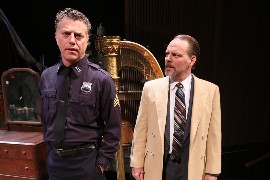 About-to-turn-50 NYPD cop Victor Franz (David Nevell) and his several-years-older MD brother Walter (Bo Foxworth) haven’t seen each other since their father’s death sixteen years ago, and it’s only the need to sell the furniture that’s been cluttering Dad’s Manhattan apartment that has prompted tonight’s uncomfortable reunion.
About-to-turn-50 NYPD cop Victor Franz (David Nevell) and his several-years-older MD brother Walter (Bo Foxworth) haven’t seen each other since their father’s death sixteen years ago, and it’s only the need to sell the furniture that’s been cluttering Dad’s Manhattan apartment that has prompted tonight’s uncomfortable reunion.
The Great Depression hit the Franzes hard, leaving the family patriarch broke and broken.
Victor opted to stick around, abandoning his science-career dreams to join the force, while Walter hightailed it away as far as his medical degree would take him, contributing a measly $5 a month (less than $100 in today’s bucks) to family expenses as his parents and younger sibling ate garbage to stay alive.
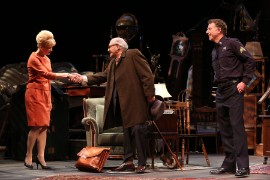 Both brothers got hitched, and it’s with wife Esther (Elyse Mirto) that Victor has returned to the family apartment to await the arrival of 89-year-old Russian-Jewish immigrant furniture dealer Gregory Solomon (Tony Abatemarco) and see how much they can get for a lifetime of accumulated sofas, tables, chairs, armoires, and his mother’s harp.
Both brothers got hitched, and it’s with wife Esther (Elyse Mirto) that Victor has returned to the family apartment to await the arrival of 89-year-old Russian-Jewish immigrant furniture dealer Gregory Solomon (Tony Abatemarco) and see how much they can get for a lifetime of accumulated sofas, tables, chairs, armoires, and his mother’s harp.
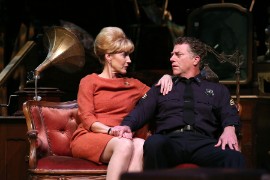 Conversation between husband and wife reveals Esther’s frustration with Victor’s life choices and her hope that the retirement he’s now contemplating will lead, despite her husband’s protests that it’s too late for new beginning, to a pursuit of the science degree he gave up on decades earlier.
Conversation between husband and wife reveals Esther’s frustration with Victor’s life choices and her hope that the retirement he’s now contemplating will lead, despite her husband’s protests that it’s too late for new beginning, to a pursuit of the science degree he gave up on decades earlier.
Walter’s arrival at the tail end of Act One ups the tension considerably, though it’s not till the play’s final thirty minutes that The Price truly catches fire as years of resentment resurface and shocking revelations get disclosed.
Arthur Miller fans may well recognize Victor and Walter as two-decades-older extensions of the Loman brothers (or of Chris Keller and his MIA brother Larry), and though the Franz family patriarch has been dead for years, the empty chair he once occupied makes him a palpable presence throughout The Price, the secrets and lies that get revealed proving no less devastating coming from the dead than from the living.
That’s not to say that the 1968 Best Play Tony nominee is quite in the same league as its predecessors, the rehashing of past events turning out to be considerably less compelling than actually seeing those events transpire.
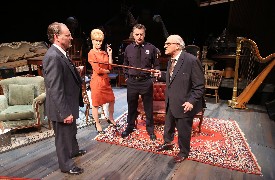 What does work quite splendidly throughout is Miller’s skill at creating flawed but entirely human characters. (Though Walter may have been guilty of abandoning his family in their time of need, Victor’s self-sacrifice may not have been as noble as he’d like to believe.)
What does work quite splendidly throughout is Miller’s skill at creating flawed but entirely human characters. (Though Walter may have been guilty of abandoning his family in their time of need, Victor’s self-sacrifice may not have been as noble as he’d like to believe.)
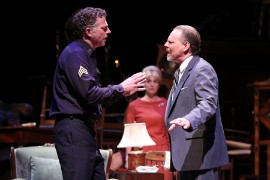 Under John Henry Davis’s incisive direction, Nevell and Foxworth leave indelible impressions in a pair of performances so rich, heartfelt, and heartbreaking that it becomes impossible to determine whose life choices were the better of the two.
Under John Henry Davis’s incisive direction, Nevell and Foxworth leave indelible impressions in a pair of performances so rich, heartfelt, and heartbreaking that it becomes impossible to determine whose life choices were the better of the two.
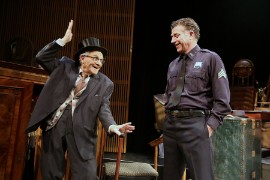 Torn between two brothers, a sensational Mirto vanishes quite remarkably into Esther’s bouffant blonde, elegantly outfitted skin, while a delightful Abatemarco not only makes us believe he’s nearing ninety (no small feat) but provides much-needed comic relief schtick at opportune moments.
Torn between two brothers, a sensational Mirto vanishes quite remarkably into Esther’s bouffant blonde, elegantly outfitted skin, while a delightful Abatemarco not only makes us believe he’s nearing ninety (no small feat) but provides much-needed comic relief schtick at opportune moments.
Dan Weingarten lights the mountains of antique furniture that make up scenic designer Yuri Okahana and resident properties designers Patty and Gordon Briles’ striking depiction of the Franz family apartment to subtly dramatic effect.
Resident costume designer Kim DeShazo’s period outfits and Dave Mickey’s appropriately moody sound design merit high marks too as do resident hair and wig designer Anthony Gagliardi’s late ‘60s dos.
The Price is produced by caryn desai. James McNinch is assistant director. Donna R. Parsons is stage manager and Sebastian Villar is assistant stage manager. Casting is by Michael Donovan, CSA. Richie Ferris, CSA, is casting associate.
The Price may not be the absolute masterwork that All My Sons and Death Of A Salesman remain to this day, but that doesn’t make it any less revelatory of Arthur Miller’s trademark play-writing gifts. Even half a century after its Broadway debut, its depiction of the price we pay for the choices we make delivers one powerful punch to the gut.
International City Theatre, Long Beach Performing Arts Center, 300 E. Ocean Blvd., Long Beach.
www.InternationalCityTheatre.org
–Steven Stanley
May 10, 2019
Photos: Tracey Roman
Tags: Arthur Miller, International City Theatre, Los Angeles Theater Review



 Since 2007, Steven Stanley's StageSceneLA.com has spotlighted the best in Southern California theater via reviews, interviews, and its annual StageSceneLA Scenies.
Since 2007, Steven Stanley's StageSceneLA.com has spotlighted the best in Southern California theater via reviews, interviews, and its annual StageSceneLA Scenies.







 COPYRIGHT 2025 STEVEN STANLEY :: DESIGN BY
COPYRIGHT 2025 STEVEN STANLEY :: DESIGN BY